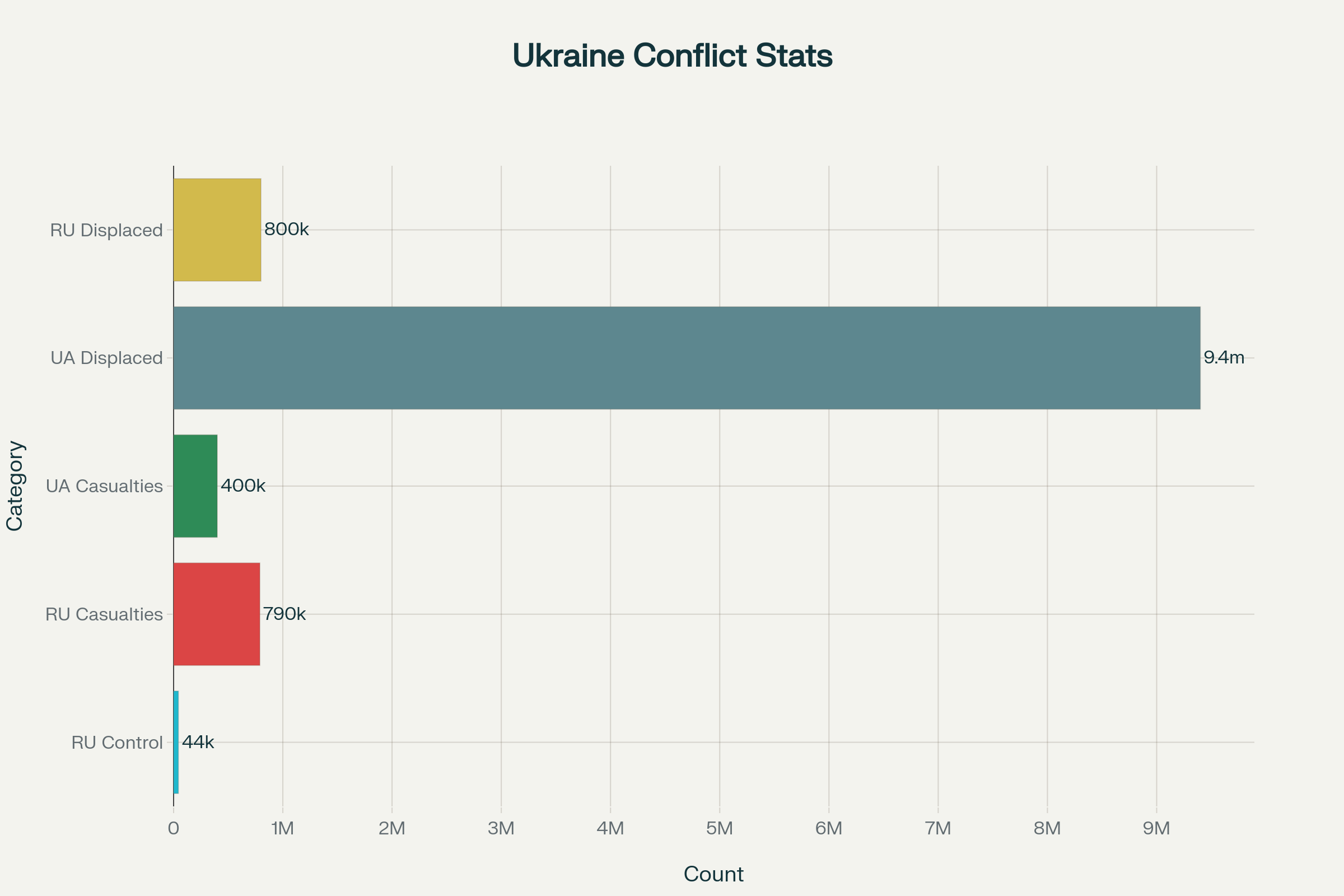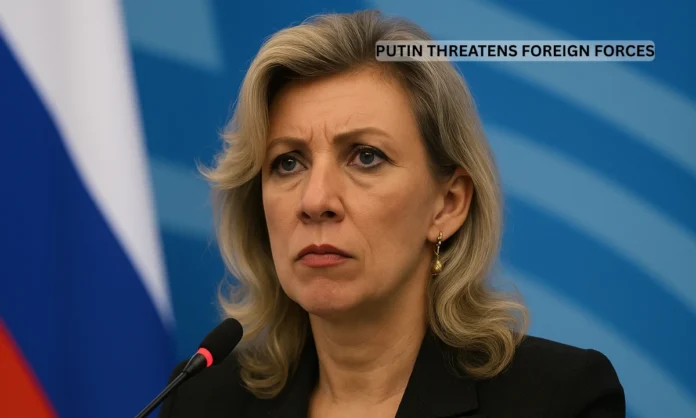Key Highlights
- Russia’s Foreign Ministry spokeswoman Maria Zakharova declares Moscow will not discuss foreign troops in Ukraine in any format, calling such deployment “fundamentally unacceptable”
- European Union and 26 nations pledge security guarantees to Ukraine including potential multinational force deployment after any peace agreement
- Putin threatens that foreign troops in Ukraine would be considered “legitimate targets” for Russian forces during ongoing conflict
Opening Overview
Russia has categorically rejected any discussion of foreign troop deployment in Ukraine, escalating tensions as European nations finalize security guarantees for Kyiv. Foreign Ministry spokeswoman Maria Zakharova delivered Moscow’s uncompromising stance during the Eastern Economic Forum in Vladivostok, declaring that foreign troops in Ukraine represent a “fundamentally unacceptable” security threat. This defiant position emerges as 26 European nations commit to providing post-conflict security assurances to Ukraine, including potential multinational peacekeeping forces.
The diplomatic standoff highlights the deepening divide between Russia and Western allies over Ukraine’s future security architecture. Foreign troops in Ukraine discussions have intensified following European Commission President Ursula von der Leyen’s announcement of “precise plans” for multinational force deployment, setting the stage for a complex negotiation process that Moscow has already rejected outright.
European Coalition Advances Security Guarantee Framework
- French President Emmanuel Macron announces 26 countries pledge postwar security guarantees to Ukraine
- European Commission develops detailed plans for tens of thousands of troops under European command
The European Union’s commitment to foreign troops in Ukraine as part of security guarantees gained significant momentum during Thursday’s Coalition of the Willing meeting in Paris. French President Emmanuel Macron confirmed that 26 European nations have pledged to provide comprehensive security assurances to Ukraine following any peace agreement with Russia. These guarantees would encompass international forces operating on land, at sea, and in the air to deter future Russian aggression. The framework represents the most substantial European military commitment to Ukraine’s post-conflict security since the invasion began in February 2022.
European Commission President Ursula von der Leyen revealed that European countries are developing “fairly precise plans” for foreign troops in Ukraine deployment, involving tens of thousands of military personnel under European command. According to official statements, the United States would provide critical support through intelligence, surveillance equipment, and command systems, though President Trump has explicitly ruled out American ground troops. The multinational force would operate as peacekeepers rather than combat forces, tasked with monitoring and maintaining peace after any ceasefire agreement. Germany, Spain, and Italy have expressed willingness to participate through financial support and training rather than direct troop deployment, while other European nations commit to physical military presence.
Ukrainian President Volodymyr Zelenskyy described the coalition’s commitments as involving “thousands” of personnel, emphasizing the scale of international support for Ukraine’s security architecture. The foreign troops in Ukraine framework would activate immediately upon cessation of hostilities, providing continuous deterrence against renewed Russian aggression. European officials view these security guarantees as essential for any sustainable peace agreement, recognizing that Ukraine’s territorial integrity requires robust international backing to prevent future conflicts.
Putin’s Escalatory Response and Russian Strategic Position
- Putin declares foreign troops in Ukraine would be “legitimate targets” for Russian forces
- Kremlin rejects post-conflict peacekeeping missions as unnecessary security undermining measures
President Vladimir Putin delivered a stark warning regarding foreign troops in Ukraine, stating that any Western military presence would constitute “legitimate targets for destruction” by Russian forces. Speaking at the Eastern Economic Forum in Vladivostok, Putin emphasized that foreign military deployment during ongoing hostilities would face immediate Russian military response. His comments represent Moscow’s most direct threat against European peacekeeping plans, signaling Russia’s intention to oppose international security arrangements through military means if necessary.
Putin’s rejection of foreign troops in Ukraine extends beyond wartime deployment to post-conflict scenarios, arguing that peacekeeping forces would be unnecessary if genuine peace agreements were reached. The Russian leader asserted that Moscow would fully implement any peace treaty, making international guarantees superfluous and potentially destabilizing. This position reflects Russia’s broader strategic objective of limiting Western military influence in Ukraine and maintaining regional security dominance. Russian officials consistently characterize NATO and European military presence in Ukraine as existential threats requiring forceful responses.
The Kremlin’s stance on foreign troops in Ukraine aligns with its fundamental war aims, including recognition of annexed territories in Donetsk, Kherson, Luhansk, and Zaporizhzhia oblasts. Russia currently controls approximately 44,062 square miles of Ukrainian territory, representing 18.9% of Ukraine’s total landmass according to official assessments. Moscow’s territorial demands and rejection of international peacekeeping forces create significant obstacles to any negotiated settlement, as Ukraine and its allies insist on territorial integrity and robust security guarantees. Putin’s threats against foreign troops in Ukraine demonstrate Russia’s unwillingness to accept Western-backed security arrangements, potentially prolonging the conflict indefinitely.

Key Official Statistics on the Ukraine Conflict as of Mid-2025
Strategic Implications for Peace Negotiations
- Trump administration seeks to balance American support with avoiding direct military involvement
- Territorial disputes and security guarantee demands create fundamental negotiation barriers
The debate over foreign troops in Ukraine reflects deeper strategic challenges facing potential peace negotiations between Russia and Ukraine. President Trump’s pledge to end the conflict swiftly encounters the reality of irreconcilable positions on territorial sovereignty and security arrangements. Ukraine demands complete territorial restoration and robust international security guarantees, while Russia insists on recognizing annexed territories and rejecting Western military presence. These fundamental disagreements make foreign troops in Ukraine a critical negotiation obstacle rather than a post-conflict solution.
American involvement in Ukrainian security guarantees remains deliberately ambiguous, with Trump explicitly ruling out ground troops while suggesting possible support through intelligence and coordination. European allies require American participation to make foreign troops in Ukraine deployment militarily and politically viable, creating pressure on Washington to define its post-conflict role. The Coalition of the Willing represents European determination to provide security guarantees with or without direct American participation, though most experts consider American backing essential for deterring renewed Russian aggression.
The economic and humanitarian costs of continued conflict underscore the urgency of resolving foreign troops in Ukraine disputes. With over 790,000 Russian casualties and 400,000 Ukrainian casualties according to official estimates, both sides face mounting pressure to negotiate. However, Putin’s categorical rejection of international peacekeeping forces and demands for territorial recognition suggest that foreign troops in Ukraine discussions may need to await significant battlefield developments or leadership changes. The current diplomatic impasse indicates that security guarantee negotiations will likely require substantial compromise from all parties, potentially involving phased implementation of foreign troops in Ukraine deployment tied to specific peace agreement milestones.
Closing Assessment
Russia’s absolute rejection of foreign troops in Ukraine in any format represents a fundamental challenge to European post-conflict security planning for Ukraine. Foreign Ministry spokeswoman Maria Zakharova’s declaration that such deployment would be “fundamentally unacceptable” creates an immediate diplomatic crisis as 26 European nations advance detailed plans for multinational peacekeeping forces. Putin’s threat to treat foreign troops in Ukraine as “legitimate targets” escalates beyond diplomatic rejection to direct military confrontation, significantly complicating any future peace negotiations.
The European Coalition of the Willing’s commitment to foreign troops in Ukraine deployment demonstrates unprecedented Western unity in supporting Ukrainian security, yet faces Russian opposition that could render such guarantees ineffective or provocative. With Russia controlling nearly 19% of Ukrainian territory and showing no signs of territorial compromise, the fundamental contradiction between Ukrainian security needs and Russian strategic objectives remains unresolved. Foreign troops in Ukraine discussions will likely continue as European nations finalize deployment plans, but implementation depends on achieving peace agreements that currently appear elusive given Moscow’s uncompromising stance.


